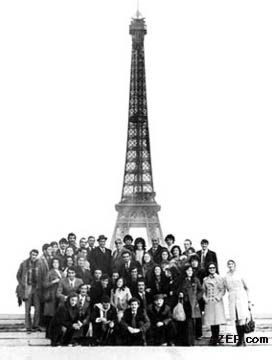|

Winter 2000 (8.4)
Page
17
Editorial
International
Relations
by Betty Blair
  Time flies. Here we are again closing
another year. It seems only yesterday that evening skies were
ablaze with fireworks marking the advent of the year 2000, heralding
the 21st century and the "Third Millennium". Time flies. Here we are again closing
another year. It seems only yesterday that evening skies were
ablaze with fireworks marking the advent of the year 2000, heralding
the 21st century and the "Third Millennium".
It seems such a few short years since Azerbaijan gained its independence
[late 1991] and began tearing down what the West thought was
an impenetrable "Iron Curtain". It's been a fascinating
journey to document this process these past eight years at Azerbaijan
International.
When the Soviet Union collapsed, Azerbaijan eagerly embraced
new economic and political alliances by joining a host of organizations
beginning with the United Nations (UN), Organization for the
Security and Cooperation of Europe (OSCE), Organization of Islamic
Conference (OIC), Black Sea Economic Cooperation (BSEC) and GUUAM
(Georgia, Ukraine, Uzbekistan, Azerbaijan and Moldova). Now,
if all goes well, Azerbaijan will become a member of the Council
of Europe in early 2001 [See page 63]. In Baku there are now
nearly 30 foreign embassies [See page 98]. Contrast that situation
with Soviet times when Azerbaijan's entire Foreign Ministry consisted
of only 12 members.
  Left: Azerbaijan State National Dance Ensemble
visiting Paris in 1976. Left: Azerbaijan State National Dance Ensemble
visiting Paris in 1976.
Photo courtesy: Azad Sharifov.
This issue - International Relations
- is dedicated to some of the projects that have been born out
of these global ties. Our aim has been to find a few exemplary
projects and explore the rationale that went into shaping them.
Why were these projects undertaken? What were the obstacles?
What worked well? Who were the catalysts? We hope these articles
provide insight into some of the international economic and cultural
ties being carried out in Azerbaijan at this moment in time.
No doubt institutions provide the infrastructure and framework,
but it's individual people who provide the incentive and drive.
But, contrary to popular belief, we're convinced that even today
in our fast-paced, complex world, a single individual can still
make a determining difference in effecting change. We've chosen
Yusif Mirsa's painting "Tête-à-tête"
for our cover-head-to-head, one-to-one - to illustrate this concept.
But relationships must be reciprocal to work. Since independence,
it's only fair to credit President Heydar Aliyev for his tireless
efforts in fostering an atmosphere of stability and openness
so that international ties could be forged.
Historically, Azerbaijan has prided itself with making friendships
with people from all over the world as it served for millennia
as a crossroads between North-South, East-West trade routes.
Contrary to what might be expected - since the country was isolated
for most of this past century - Azerbaijan is far from xenophobic,
unlike some of its neighbors.
Few foreigners who personally witnessed Azerbaijan as it was
just starting to get on its feet are still around in Baku. In
fact, most embassies, international companies and humanitarian
organizations - have already changed their management three,
sometimes four, times.
There have been some illustrative personalities along the way;
and to be honest, there have been others, including ambassadors,
unfortunately, who might best be categorized as "neither
fish, nor meat" as Azerbaijanis are fond of describing non-entities.
But those who have left their mark on Azerbaijan have done so
by forging ahead with passion, magnanimity and determination.
For example, could anyone who knows French Ambassador Jean Pierre
Guinhut ever really doubt that this Orientalist and polyglot
would push for French language learning centers all over the
country. Of course, he wants Azerbaijanis to come to know and
appreciate his culture, but he also views the French language
as a medium that will help them gain access to higher education,
especially in the arts, philosophy, business and science [See
page 22].
Olav Berstad, Norway's Ambassador is an archeologist by training.
His government is helping to sponsor the archeological study
of a Caucasus Albanian Christian church in Kish, which may be
turn out to be 1,500 years old. Berstad is convinced that in
addition to the historical and architectural aspects of the project,
there are even psychological dimensions, such as strengthening
the nation's identity in the Caucasus [See page 18].
The largest commitment by any foreign company to help alleviate
the refugee housing situation in Azerbaijan has been through
the efforts of Eros Agostinelli of Agip Azerbaijan, a subsidiary
of Eni of Italy. Agip has committed a concentrated lump sum of
$2.25 million to house two separate communities of more than
400 families. With the guidance of UNHCR's Didier Laye and his
dedicated team, together they are helping to provide some comfort
and dignity to these families who still dream of returning to
their homelands held under Armenian military occupation. [See
page 98].
Paolo Parviz, an oldtimer in Baku since 1993, seems to be a glutton
for punishment when it comes to tackling major infrastructure
projects. After completing the various phases of the Hyatt complex,
he tackled Shollar Bottling Company. Now it's the Baku Steel
Factory which is scheduled to open in 2001 [See page 66].
Parviz seems to have an obsession for beautification. While working
on the Hyatt Regency, he seemed just as excited about painting
the adjacent school, cleaning up the neighboring park and furnishing
street lights for boulevard, as he was in completing his own
building. Today, he's still on an aesthetics kick-gathering up
the scrap metal strewn across so much of the country's landscape
and remelting it into steel bars for future construction projects.
We've also used this issue to explore the kinds of cooperation
that are not taking place, especially between the United States
and Azerbaijan. With surprising candidness, Stanley Escudero,
former U.S. Ambassador to Azerbaijan who recently retired from
the State Department, speaks frankly about the effect of U.S.
legislation [Section 907 of the Freedom Support Act] that denies
direct U.S. aid to the Azerbaijani government. "It's like
working with your hands tied behind your back," he admitted.
Escudero is convinced that the U.S. foreign policy of economically
boycotting foreign nations - for whatever reason - simply doesn't
work. In the case of 907, he insists that it's a "lose-lose-lose"
situation - for Azerbaijan, for the United States, as well as
for Armenia, which pushed for this punitive legislation in the
halls of Congress in the first place [See page 50].
Here at the magazine, we're committed to continuing our efforts
to facilitate relationships between members of the the international
community and Azerbaijan. And so from all of us here at Azerbaijan
International, may the New Year 2001 be filled with international
friendship as deep and as bountiful as the ocean; and in that
pursuit, may no mountain be too rugged or too difficult to scale.
____
From Azerbaijan
International
(8.4) Winter 2000.
© Azerbaijan International 2000. All rights reserved.
Back to Index
AI 8.4 (Winter 2000)
AI Home
| Magazine Choice | Topics
| Store
| Contact
us
|


